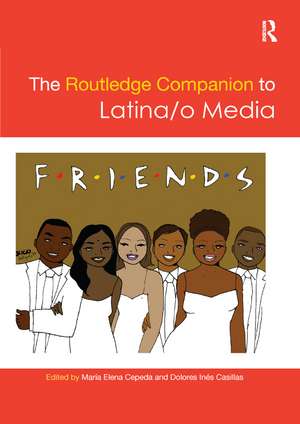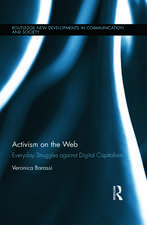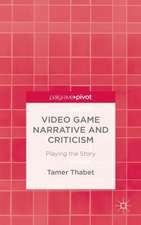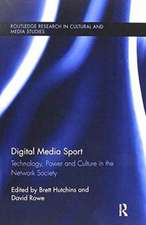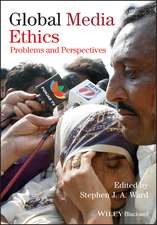The Routledge Companion to Latina/o Media: Routledge Media and Cultural Studies Companions
Editat de Maria Cepeda, Dolores Inés Casillasen Limba Engleză Paperback – 10 dec 2019
| Toate formatele și edițiile | Preț | Express |
|---|---|---|
| Paperback (1) | 310.73 lei 6-8 săpt. | |
| Taylor & Francis – 10 dec 2019 | 310.73 lei 6-8 săpt. | |
| Hardback (1) | 1413.83 lei 6-8 săpt. | |
| Taylor & Francis – 19 sep 2016 | 1413.83 lei 6-8 săpt. |
Din seria Routledge Media and Cultural Studies Companions
-
 Preț: 345.44 lei
Preț: 345.44 lei - 9%
 Preț: 1523.12 lei
Preț: 1523.12 lei -
 Preț: 340.25 lei
Preț: 340.25 lei - 8%
 Preț: 383.07 lei
Preț: 383.07 lei -
 Preț: 391.49 lei
Preț: 391.49 lei -
 Preț: 349.15 lei
Preț: 349.15 lei -
 Preț: 334.02 lei
Preț: 334.02 lei -
 Preț: 345.92 lei
Preț: 345.92 lei -
 Preț: 444.70 lei
Preț: 444.70 lei -
 Preț: 407.13 lei
Preț: 407.13 lei -
 Preț: 337.62 lei
Preț: 337.62 lei -
 Preț: 338.72 lei
Preț: 338.72 lei - 9%
 Preț: 1488.18 lei
Preț: 1488.18 lei -
 Preț: 338.53 lei
Preț: 338.53 lei -
 Preț: 353.26 lei
Preț: 353.26 lei - 26%
 Preț: 1217.73 lei
Preț: 1217.73 lei - 18%
 Preț: 1562.36 lei
Preț: 1562.36 lei - 26%
 Preț: 1213.65 lei
Preț: 1213.65 lei - 30%
 Preț: 1224.49 lei
Preț: 1224.49 lei - 12%
 Preț: 308.63 lei
Preț: 308.63 lei - 25%
 Preț: 1225.85 lei
Preț: 1225.85 lei -
 Preț: 466.14 lei
Preț: 466.14 lei - 18%
 Preț: 1562.36 lei
Preț: 1562.36 lei - 9%
 Preț: 1522.72 lei
Preț: 1522.72 lei - 26%
 Preț: 1215.67 lei
Preț: 1215.67 lei - 26%
 Preț: 1357.71 lei
Preț: 1357.71 lei - 11%
 Preț: 331.71 lei
Preț: 331.71 lei - 15%
 Preț: 461.73 lei
Preț: 461.73 lei - 25%
 Preț: 1220.17 lei
Preț: 1220.17 lei - 25%
 Preț: 1251.25 lei
Preț: 1251.25 lei - 26%
 Preț: 1246.35 lei
Preț: 1246.35 lei - 18%
 Preț: 1564.87 lei
Preț: 1564.87 lei - 18%
 Preț: 1812.73 lei
Preț: 1812.73 lei - 18%
 Preț: 1544.82 lei
Preț: 1544.82 lei - 25%
 Preț: 1250.03 lei
Preț: 1250.03 lei - 14%
 Preț: 320.10 lei
Preț: 320.10 lei - 25%
 Preț: 1248.39 lei
Preț: 1248.39 lei -
 Preț: 424.55 lei
Preț: 424.55 lei - 18%
 Preț: 1814.82 lei
Preț: 1814.82 lei
Preț: 310.73 lei
Preț vechi: 351.49 lei
-12% Nou
Puncte Express: 466
Preț estimativ în valută:
59.46€ • 62.25$ • 49.20£
59.46€ • 62.25$ • 49.20£
Carte tipărită la comandă
Livrare economică 05-19 aprilie
Preluare comenzi: 021 569.72.76
Specificații
ISBN-13: 9780367868789
ISBN-10: 0367868784
Pagini: 460
Dimensiuni: 174 x 246 x 30 mm
Greutate: 0.68 kg
Ediția:1
Editura: Taylor & Francis
Colecția Routledge
Seria Routledge Media and Cultural Studies Companions
Locul publicării:Oxford, United Kingdom
ISBN-10: 0367868784
Pagini: 460
Dimensiuni: 174 x 246 x 30 mm
Greutate: 0.68 kg
Ediția:1
Editura: Taylor & Francis
Colecția Routledge
Seria Routledge Media and Cultural Studies Companions
Locul publicării:Oxford, United Kingdom
Public țintă
Postgraduate and UndergraduateNotă biografică
María Elena Cepeda is Associate Professor of Latina/o Studies at Williams College, where her research and teaching focus on transnational Latina/o popular media and music, audience studies, gender, and language politics. She is the author of Musical ImagiNation: U.S.-Colombian Identity and the Latin Music Boom.
Dolores Inés Casillas is Associate Professor in the Department of Chicana and Chicano Studies at the University of California, Santa Barbara. She has published essays on radio humor, "accent" use within popular culture, immigration-based media, Chicana/o listening practices and the award-winning book, Sounds of Belonging!: U.S. Spanish-Language Radio and Public Advocacy.
Dolores Inés Casillas is Associate Professor in the Department of Chicana and Chicano Studies at the University of California, Santa Barbara. She has published essays on radio humor, "accent" use within popular culture, immigration-based media, Chicana/o listening practices and the award-winning book, Sounds of Belonging!: U.S. Spanish-Language Radio and Public Advocacy.
Cuprins
Part I: Understanding Contemporary Latina/o Media Introduction Chapter 1: Authenticity, Appropriation, Articulation: The Cultural Logic of Latinidad, Esteban del Río Chapter 2: The Transnational Restructuring of Communication and Consumption Practices: Latinos in the Urban Settings of Global Cities, Jéssica Retis Chapter 3: A Political-Economic Analysis of the Evolution of Latino Media in the New Latino South, Lucila Vargas and Joseph Erba Chapter 4: Implicit Utopias and Ambiguous Ethnics:? Latinidad and the Representational Promised Land,Angharad Valdivia Chapter 5: Phenotypicality Bias on Television?: A Quantitative Content Analysis of Primetime TV, Dana Mastro and Alexander Sink Chapter 6: Beyond the Market: Lessons Learned from Latina/o Audiences, Kristin Moran Part II: Access, Policy and Production in Latina/o Media Introduction Chapter 7: Altering the U.S. Soundscape through Latina/o Community Radio, Mari Castañeda Chapter 8: The State of Emergency Communications at a Time of Population and Linguistic Shifts: A Case Study in Central Texas, Federico Subervi? Chapter 9: Direct to DVD: A Case Study of Latina/o Genre and Audience, Orquidea Morales Chapter 10: From the Bronze Screen to the Computer Screen: Latina/o Web Series and Independent Production, Vittoria Rodríguez and Mary Beltrán Chapter 11: Latina/Latino Community Journalism: A San Francisco Case Study, Katynka Zazueta Martínez Chapter 12: The Cycle of Latina/o Community Media Activism: Digital Storytelling in Springfield, MA, Rogelio Miñana Part III: Representations of Latinas/os in the Media Introduction Chapter 13: Imagining Postville: National Public Radio and the Discourse of Latina/o Representation, Hannah Noel Chapter 14: What’s in an Accent?: Gender and Cultural Stereotypes in the Work of Sofía Vergara, Héctor Fernández L'Hoeste Chapter 15: The Location of (U.S.) Latin Rock, Ignacio Corona Chapter 16: Singing about Separation: Deportation, #Not1More, and La Santa Cecilia’s 'ICE: El Hielo,' Lorena Alvarado Chapter 17: The Deterritorialized Political Economy of Narcocorridos in the USA, Hector Amaya Chapter 18: What To Do with All this Beauty?: The Political Economy of Latina Stardom in the 21st Century, Frances Negrón-Muntaner Chapter 19: Sofía Vergara Made Me Do It: On Beauty, Costeñismo and Transnational Colombian Identity, Isabel Cristina Contreras Porras Chapter 20: Sex, Service and Scenery: Latina Sexualities in the Pages of Vogue, Aida Hurtado Part IV: Engendering New Practices and Meanings Behind Latina/o Media Consumption Introduction Chapter 21: Voices from the Borderlands: Young Latina/os Discuss the Impact that Culture and Identity have on their Media Consumption, Viviana Rojas and Juan Piñón Chapter 22: Latina/os’ Facebook Usage: An Interethnic and Intergenerational Exploration of their Engagement with a Social Networking Site, Adolfo Mora and Viviana Rojas Chapt
Recenzii
"This must-have collection represents the definite resource on the present state and future directions of Latino/a media studies, and makes amply clear that Latino/a media scholars are at the vanguard of the most cutting edge interventions in media and communication studies today." –Arlene Dávila, New York University
"Cepeda and Casillas’ volume is a milestone in the study of Latin@ and media/communication studies. Written by well-established and emerging scholars coming from the humanities and the social sciences, the collection invite the readers to learn about a broad array of areas—from immigrants’ media consumption, to community journalism, to Latin@ web series, to Latino rock." –Yeidy M. Rivero, University of Michigan
"Cepeda and Casillas’ volume is a milestone in the study of Latin@ and media/communication studies. Written by well-established and emerging scholars coming from the humanities and the social sciences, the collection invite the readers to learn about a broad array of areas—from immigrants’ media consumption, to community journalism, to Latin@ web series, to Latino rock." –Yeidy M. Rivero, University of Michigan
Descriere
The Routledge Companion to Latina/o Media provides students and scholars with an indispensable overview of the domestic and transnational dynamics at play within multi-lingual Latina/o media. The book examines both independent and mainstream media via race and gender in its theoretical and empirical engagement with questions of product
